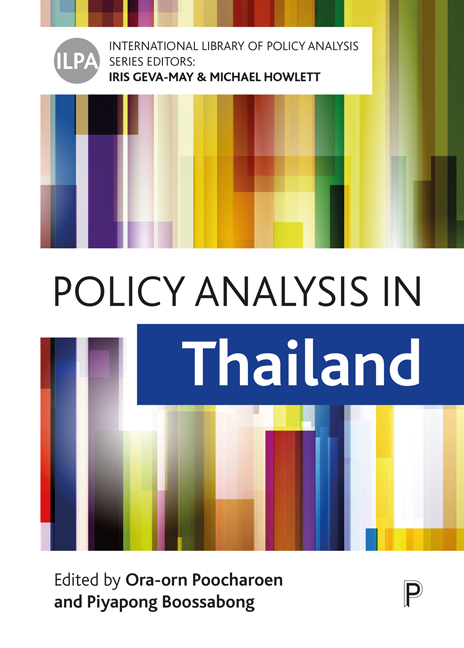Book contents
- Frontmatter
- Contents
- List of figures and tables
- List of abbreviations
- Notes on contributors
- Editors’ introduction to the series
- Introduction
- Part One History, styles and methods of policy analysis in Thailand
- Part Two Policy analysis within executive government
- Part Three Policy analysis beyond executive government
- Part Four Political parties and interest groups in policy analysis
- Part Five Policy analysis education and research
- Index
ten - Political movements as expression of public opinion for agenda setting in Thailand
Published online by Cambridge University Press: 20 January 2024
- Frontmatter
- Contents
- List of figures and tables
- List of abbreviations
- Notes on contributors
- Editors’ introduction to the series
- Introduction
- Part One History, styles and methods of policy analysis in Thailand
- Part Two Policy analysis within executive government
- Part Three Policy analysis beyond executive government
- Part Four Political parties and interest groups in policy analysis
- Part Five Policy analysis education and research
- Index
Summary
Introduction
Public opinion expression is a crucial aspect of policy analysis engaged at various stages in a policy cycle. A deliberative policy analysis approach suggests taking people's opinions seriously as citizens’ voices are valued as a decisive basis for a given policy (Fischer and Boossabong, 2018). Also, policy implementation and evaluation are both processes that benefit from people's voices. In the context of a consolidated democracy, public opinion expression takes place via both parliamentary politics and political movements. Public opinion can be captured in various forms such as polling, participatory process, public surveys, protests and other forms of disobedience actions. Several distinct political movements have shaped important turning points in contemporary Thailand. These political movements reflect certain aspects of public opinion. Through new discourses and experiences that each movement ignites, they also shape new public opinion. Thus, these movements are not ignored by policy analysts in Thailand. It is well understood that change in the political landscape is a crucial determinant of all public policies and their ecosystems. In fact, political movements and protests have become de facto indicators of public opinion for decision-makers and policy analysts. Hence, this chapter will focus on describing the key movements in Thailand.
The chapter aims to portray political movements as a form of public opinion expression in contemporary Thailand and explain how the movements influence agenda setting. The agenda-setting process can be seen as a struggle to construct a new public discourse rather than merely a fight for sending messages to the government. The chapter employs Antonio Gramsci's notion of ‘war of position’ – struggle in the terrain of ideas, thought and culture via mass media as a crucial tool – as a framework to explain the politics of agenda setting in Thailand. Since the 1997 political reformation, there were five distinct attempts to construct public discourse: demanding a strong state; rallying against Thaksin; challenging the old regime; subverting the common sense; and, once again, for political reform.
- Type
- Chapter
- Information
- Policy Analysis in Thailand , pp. 186 - 200Publisher: Bristol University PressPrint publication year: 2023



